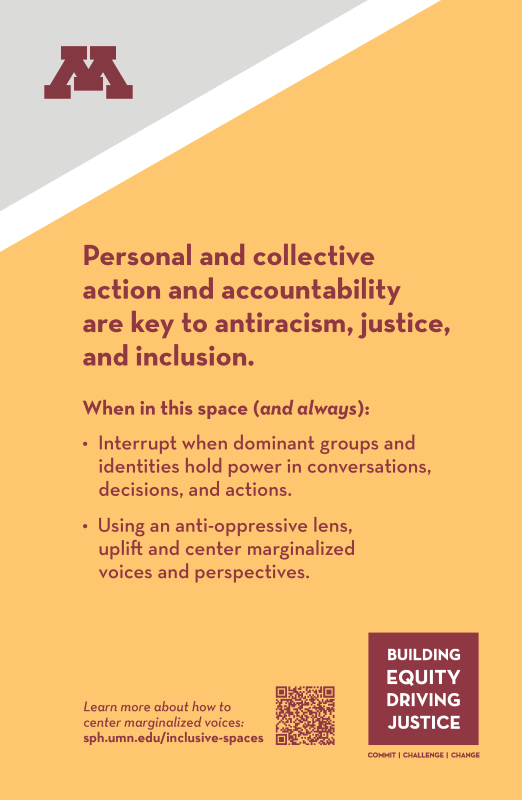SPAR Signage
In spring 2023, the School of Public Health (SPH) installed a sign in conference rooms and gathering spaces that supports our Strategic Plan for Antiracism.
On this sign are three terms intended to help our community create a more just and inclusive environment. It’s important that we have a common understanding of these terms: centering marginalized voices, interrupting, and dominant groups.
SPH faculty, staff, and students can order copies of this sign by emailing sphcomm@umn.edu.
Centering marginalized voices
As written on the sign: “…center marginalized voices and perspectives.”
Centering marginalized voices means bringing those who are not often heard into a place of prominence in conversations and decision making. Doing this is important to becoming an antiracist community and leads to better, more nuanced, and creative outcomes. It improves inclusion.
We must make sure that our school hears and prioritizes the voices and perspectives of people who are excluded, marginalized, and ignored because of racism and other kinds of oppression. This includes, but is not limited to: Black, Indigenous, and people of color (BIPOC); women; LGBTQIA+ people; and people with disabilities.
Everyone at SPH is responsible for making all community members feel fully included and considered.
Centering marginalized voices can look like:
- Practicing deep and active listening.
- Inviting folks from marginalized communities to steer conversations.
- Asking follow-up questions.
- Crediting and citing the people who originate ideas when applicable.
Interrupting
As written on the sign: “Interrupt when dominant groups and identities hold power in conversations, decisions, and actions.”
Interrupting in this context means to recognize that racism and oppression may be at work in conversations, decisions, and actions and to step up and stop the harm that may be taking place at that moment.
Interrupting racism and oppression can look like:
- Redirecting a conversation that has gone off course.
- Asking for clarification when someone says something that seems harmful.
- Requesting to have a private conversation after the class or meeting.
- Reaching out to a friend or ally for support or guidance on approaching someone.
- Contacting the SPH office of Diversity, Equity, and Inclusion for support.
Interrupting is most effective when we practice it and when we commit to moving away from passivity toward actively stopping oppression in its tracks.
As a community committed to antiracism, we are responsible for keeping each other accountable. Learn more about how to interrupt oppression and racism, practice with resources such as those available through Tufts University.
Dominant groups
As written on the sign: “Interrupt when dominant groups and identities hold power in conversations, decisions, and actions.”
A dominant group is one whose voices and opinions carry the most weight in a situation, fairly or unfairly. We each have different roles and social positions in the school, and it can often be difficult to challenge people or groups who have a dominant place because of privilege, inside knowledge, official standing, etc. For example, students may feel uncomfortable raising certain issues with their professors. Our identities also hold inherent power, and those with marginalized identities may feel disempowered, even without being explicitly told so. Race, gender, age, size, religion, sexuality, national origin, disability, or any combination of these can add to the power imbalances already present in academia.
We encourage everyone in our community to be aware of the power dynamics within groups or in individual settings and how those dynamics may be keeping our school from fulfilling its antiracism goals. Once you recognize these dynamics, it is crucial for you to speak up, no matter how difficult it may be, in an effort to bring equity and balance to all interactions. Consider what it means to have power with, instead of power over.
Bringing balance to conversations can look like:
- Voicing that you feel that a group or person is holding more than their share of power in a situation.
- Asking that all voices be heard and respected.
- Consulting SPH and DEI leadership on how to manage what you see as an inequitable distribution of power and the dominance of particular groups/people.

